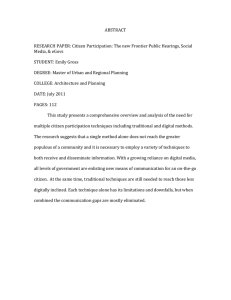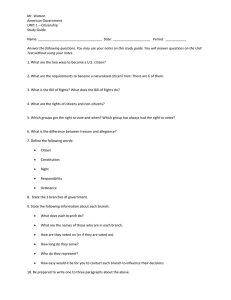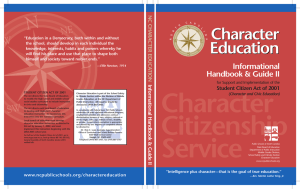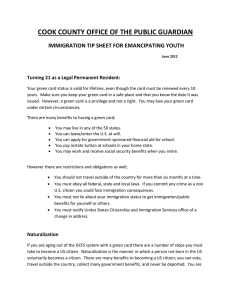Document 11103024
advertisement
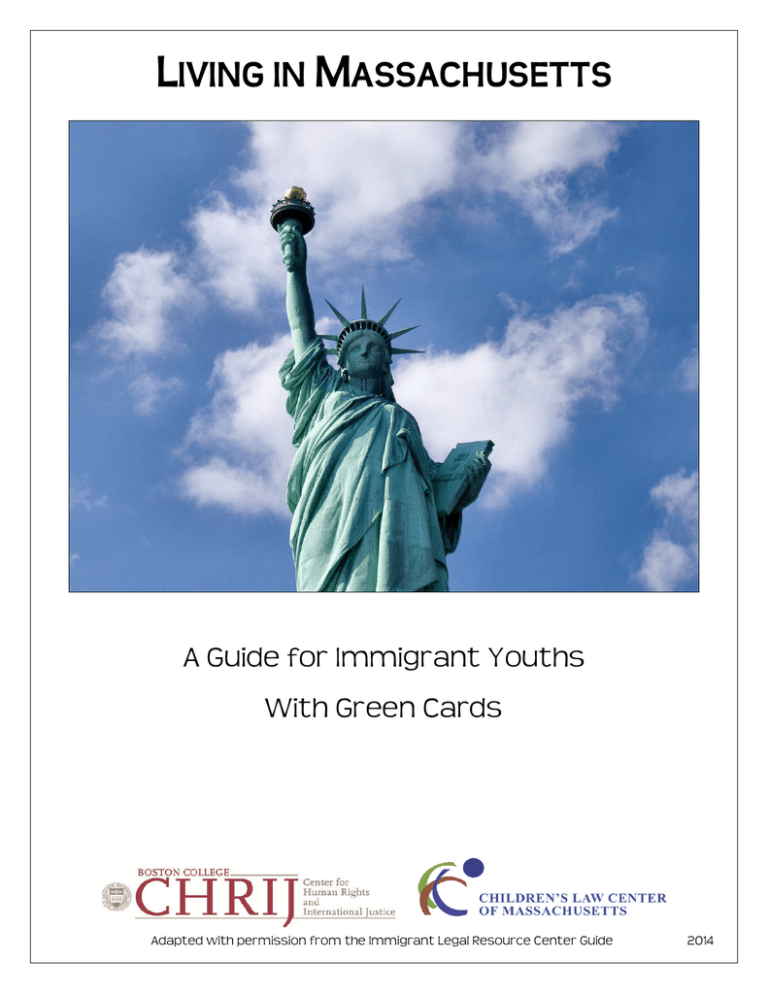
LIVING IN MASSACHUSETTS A Guide for Immigrant Youths With Green Cards Adapted with permission from the Immigrant Legal Resource Center Guide 2014 What is a Green Card? A green card is a document immigration officials give to an immigrant as proof that person has permission to live in the United States. People with green cards are often called legal permanent residents. Immigration officials give many different kinds of permissions to stay in the United States. Legal permanent residence (a green card) is the only permission that can lead to U.S. citizenship. Someone with a green card is not a U.S. citizen. A person who has a green card does not have all the same rights as a U.S. citizen. For example, a person who has a green card cannot vote in elections. But a person who has a green card still enjoys many rights. A person with a green card may live, work, and study in the United States. The permission to stay is not permanent even though a person who has a green card is called a “legal permanent resident.” The permission can be lost. A person who loses their legal permanent residence risks deportation to their country of birth. A work permit is not a green card. If you have a work permit, you may be allowed to apply for a green card. But you have to apply for the green card separately. How do I find out if I am a person who has a green card? If you think you were born in another country, it is important to find out if you have permission to live in the United States. Start by asking your parents. If your parents have green cards, there is a good chance you have a green card too. If you are still not sure, speak to an immigration lawyer. If you are a person with a green card, you should have an identification card that looks like this: Every person with a green card has an “alien number” or “A number” that is written on the green card. You should make a copy of your card and keep the copy in a safe place. Keep your green card safe! It costs a lot to replace. If you lose your green card, you will need to know your “A number” to get a replacement card. Remember: having a green card does not make you a U.S. citizen. 2 | P a g e 10 Things Every Youth with a Green Card Should Know 1) Apply for U.S. citizenship as soon as you can. Citizenship is the only true protection from deportation. See page 6 for more info on when and how to apply. 2) Stay out of trouble with the law and away from troublemakers. Even if you have a green card, a crime – even a minor one – could lead to your deportation. 3) If you are charged with a crime, tell your criminal lawyer you are not a U.S. citizen. It is best to be honest. The truth will allow the lawyer to help you best. 4) Tell immigration authorities when you move. You should tell them of a change of address within 10 days of the move. See page 4 for more info. 5) You will need to get a new green card every 10 years. You still have permission to live in the United States even after your card expires, but you will need to replace the card. See page 4 for more info. 6) Don’t leave the country for long periods. If you are gone for 6 months, you might have trouble getting back into the United States. If it’s more than a year, you might not be able to return to the United States. If you have a good reason to be gone for a long time, you can ask for permission; you need to do this before the trip, if possible. 7) To travel outside the U.S., you need a passport from your country of citizenship. If you later become a U.S. citizen, you can use a U.S. passport. 8) If you are male, you must register for the draft (“selective service”) when you turn 18. Registering with the selective service is required of all males and will help you become a citizen later. See page 8 for more info. 9) If you are working, file your taxes. This is required and will keep you out of legal trouble. It will also help you become a U.S. citizen later. See page 11 for more info. 10) Never say you are a U.S. citizen when you are not. 3 | P a g e Know Your Rights & Responsibilities As a legal permanent resident (person with a green card) in Massachusetts, you have a RIGHT to: • Live anywhere in the United States • Work anywhere in the United States (except some government positions) • Attend school and college anywhere in the United States • Go to college and get federal financial aid and in-­‐state tuition in Massachusetts • Get a Social Security Number • Get a driver’s license in Massachusetts • Travel outside the United States (but not for long periods) • Receive local, state, and federal benefits and public assistance As a legal permanent resident (person with a green card) in Massachusetts, you have a RESPONSIBILITY to: • Update your address with immigration when you move • Renew your green card when it expires (every 10 years) • Follow all local, state, federal, and immigration laws How to Change Your Address: As long as you have a green card, you should tell immigration officials every time you move. If you change your address, you should tell the immigration officials within 10 days of the move. There is a free form (called an AR-­‐11 form) to tell immigration officials of a new address. You can mail the form or complete it online. To receive a paper form, call 1-­‐800-­‐870-­‐3676. To change your address online, visit www.uscis.gov/addresschange How to Replace a Lost or Expired Green Card: Your green card will expire within 10 years of the date you received it. The expiration date is written on the card. Even after the card expires, you are still a lawful permanent resident. But it is best to have a valid card at all times. Know the expiration date. Renewing your card costs $450 or more, so you may need to start saving well in advance of the expiration date. To renew your card (or replace a lost card), you must file a form (called the I-­‐90 form) with immigration. You can mail the form or complete it online. To receive a paper form, call 1-­‐800-­‐870-­‐3676. To renew your card online, visit www.uscis.gov/i-­‐90 4 | P a g e Deportation: It Could Happen to You The permission to live in the United States with a green card is not permanent even though a person who has a green card is called a legal permanent resident. The permission can be lost by not following the rules. A person who loses their legal permanent residence (or permission to stay) risks deportation to their country of birth. After deportation, it is very difficult – and sometimes impossible – to return to the U.S. Anyone who is not a U.S. citizen can be deported if they do not follow the rules. This includes people with green cards who have lived in the United States since they were babies. It does not matter if you have lived here your whole life or you cannot speak the language of your home country. There are many crimes that can lead to deportation. Here are just a few. A person with a green card may face deportation if they are convicted of a: • drug crime, even minor • theft crime • assault of another person or other serious or violent crime such as rape or murder • weapons crime, such as illegally having a gun • domestic violence or violating a protective order A person with a green card can also be deported for certain conduct, even if they are not convicted. For example, a person with a green card can be deported if they: • claim to be a U.S. citizen or vote (even by accident!) • marry a person just to help them get a green card BUT a person with a green card CANNOT be deported for: • forgetting to tell immigration officials about a new address or • forgetting to renew their green card. SHOULD YOU TELL YOUR LAWYER ABOUT YOUR GREEN CARD? Yes! If you are concerned about losing permission to stay in the United States, it is good to seek out the advice of an immigration lawyer. If you are ever arrested and required to go to court, it is important to tell your criminal lawyer the truth. Make sure your criminal lawyer knows that you have a green card and are not a U.S. citizen. This information may help the lawyer help you to avoid deportation, even if you are found guilty of the crime. Remember all lawyers must respect confidentiality rules. Lawyers will not share confidential information you tell them. 5 | P a g e Becoming a U.S. Citizen Becoming a U.S. citizen is the only true way to protect yourself from deportation! It’s a good idea to apply for citizenship as soon as you are allowed to. Once you become a U.S. citizen, you can: • Be safe from deportation • Vote in federal and state elections • More easily and quickly help family members come to the United States • Travel outside the US for long periods • Get any government job • More easily receive government benefits To apply to become a U.S. citizen, you need to: • Be at least 18 years old • Have a green card for 5 years (less time if you marry a U.S. citizen or join the military) • Be able to pass an English test to show you can read and write in English • Pay all your taxes and child support, if you owe them • Stay out of trouble (minor crimes may not be a problem; talk to an immigration lawyer) • Register for the Selective Service when you are 18 (males only) • Send an application and fee (of $680 or more) to the U.S. Citizenship & Immigration Services • Attend an interview and take an oath of allegiance to the United States. Doubts? Ask an Immigration Lawyer If you have any doubts about whether you can apply for citizenship, talk to an immigration lawyer before applying. It is important to tell the lawyer the truth so the lawyer can help you determine whether you can apply and help you apply. Remember when you apply for citizenship, you are inviting the government to review all of your records. This could lead them to find something negative about you, such as a crime or a lie you told the government. If you have any doubts, it is better to check with an immigration lawyer. All lawyers must respect confidentiality rules -­‐ they will not share confidential information you tell them. 6 | P a g e Are you a U.S. Citizen without Knowing It? Children under age 18 who are lawful permanent residents (have a green card) can sometimes automatically become U.S. citizens through their parents. This is called “derivative citizenship.” The rules for derivative citizenship are complicated and have changed over time. People born on or after February 28, 1983, who are living in the U.S. as lawful permanent residents, automatically become U.S. citizens if at least one parent becomes a U.S. citizen while the child is under age 18. Different rules may apply in situations where the parents were not married when the child was born. If you are not sure whether you automatically became a U.S. citizen through your parents, check with an immigration lawyer! 7 | P a g e Immigrants and the U.S. Military What is Selective Service? The Selective Service System is used to keep information about men who could be made to serve in the military. I have a green card. I am not a U.S. citizen. Do I have to register for the Selective Service? Yes, registering for the Selective Service is required. This is not the same as joining the military. The Selective Service simply keeps information about men who could serve in the military if it became necessary, but the U.S. government has not required men to serve in the military since 1973. Women and girls do not have to register for the Selective Service. When do I have to register? If you are a man between the ages of 18 and 26 and you live in the United States, then you must register with the Selective Service. A man should register with Selective Service after his 18th birthday, but late registrations are accepted up until a man has reached age 26. How do I register for the Selective Service? You can register by filling out a form at any U.S. Post Office. You can also fill out the form online at www.sss.gov What could happen if I don’t register for the Selective Service? Registering with the Selective Service is required by law. If you do not register, you may be denied federal financial aid for college, a federal job, or federal job training. It could also affect your chances of becoming a U.S. citizen. If you have forgotten to register, it might not be too late. Contact the Selective Service Office. Can I volunteer to join the military if I have a green card, and I am not a U.S. citizen? Yes, if you have a green card, you can join and serve in the armed forces voluntarily. 8 | P a g e Social Security Numbers What is a Social Security Number (SSN)? A Social Security number is an important piece of your identity as a legal permanent resident. A Social Security number has nine digits. It is different than your “A” or “Alien” Number. Can a person with a green card get a SSN? Yes, a person with a green card can receive a Social Security number and a card. Why do I need a SSN? You need a Social Security number to get a job, collect Social Security benefits, and receive other government services. You do not often need to show your Social Security card, so you should keep it in a safe place with your other important papers. Do I have to apply for a SSN? Yes, people born in the United States get a Social Security number automatically when they are born. If you are older when you receive a green card, you have to go to the Social Security office in person to apply for a social security number. How do I apply for a SSN? Applying for a Social Security number and card is free. When you visit the Social Security office, you should bring your green card. You will have to complete an application for a Social Security card (with a form called Form SS-­‐5). You will have to show at least two original documents proving your identity, permission by immigration officials to live in the United States, and age. The agency will mail your social security number and social security card once your application is approved. The office provides free interpreter services to help you both in person and over the phone. For more information, visit www.socialsecurity.gov or call 1-800-772-1213 9 | P a g e Working in the United States What do I need to work legally in Massachusetts? To work legally in Massachusetts, you must • Be 14 years old or older • Have some kind of identification document • Have proof – such as a green card – that immigration officials gave you permission to work in the United States Can I work in any job? If you are under 18, you may not be allowed to work in hazardous or dangerous jobs. You will only be allowed to work certain hours, especially during the school year. What documents do I need to complete to start working? Once you are hired for a job, you will need to fill out a form called an I-­‐9. As part of this form, you will need to provide documents to show your identity. You will also need to show that immigration officials gave you permission to work in the United States. You can show your green card because it shows your identity and your permission to work. Will I have to pay taxes on the money I earn? Yes, you will have to pay taxes on the money you earn in your job. Your employer will ask you to fill out a form called a W-­‐4. The W-­‐4 form is related to your taxes. You will need to provide your social security number to fill out the W-­‐4 form. The W-­‐4 form allows your employer to take money from every paycheck and send it to the federal government to pay for your taxes. This is called “withholding taxes.” By withholding taxes, or sending some of your paycheck to the government each time you receive a paycheck, you will not need to pay all your taxes at once when taxes are due on April 15th every year. See page 11 for more information on paying taxes. 10 | P a g e Paying Taxes What are taxes? Taxes are the money people must pay to the government so the government can provide benefits like public schools, parks, roads, and other public services. Do I have to pay taxes? Generally, if you are working, you will have to pay taxes. If you did not earn enough money in a year, you may not owe any taxes. But every year you should file paperwork with the government called an income tax return. The income tax return calculates how much tax, if any, you owe the government. How do I pay my taxes? Every year before April 15th, you must file a form called an income tax return with the Internal Revenue Service (IRS) and a similar form with the Massachusetts government. These forms will calculate how much tax you have to pay to the state and federal governments. Rather than pay all of your taxes on April 15th, you can have state and federal taxes taken from each paycheck over the entire year. To do this, you must fill out a W-­‐4 form and Massachusetts form with your employer. You should provide your social security number on your forms. When you file your income tax returns on April 15, you will know how much you still owe in taxes. If you pay more taxes during the year than needed, the government will give you money back (a “refund”) after you send your income tax returns. What happens if I do not file an income tax return or pay my taxes? The government could give you a fine and charge you more money. If you owe a lot, you could go to jail. It could also hurt your chances of becoming a U.S. citizen. What if I have been working, but have not paid taxes? If you have not paid your taxes, you should ask a tax expert for help. The tax expert can help you correct the problem by filing income tax returns for past years. You will find out if you owe money, or you will receive money back from the government if you have already paid too much money. Will paying my taxes help me become a U.S. citizen? Yes! If you apply to become a citizen of the United States, the government will want to know that you have paid all your taxes. 11 | P a g e Getting a Driver’s License in Massachusetts Who needs to apply for a driver’s license? If you live in Massachusetts and want to drive, you must apply for a Massachusetts driver’s license. A driver’s license looks like the identification to the right: Do I need a green card to apply for a driver’s license? You must have a green card or other form of permission to live in the United States from immigration officials in order to apply for a driver’s license. When can I apply for a driver’s license? You can apply for a limited permit when you turn 16 years old. If you are between 16½ and 18 years old, you can apply for a full license after you complete a driver’s education class. You must also get consent from your parent or guardian. If you are over 18, you can apply for a full license without completing a class or getting permission from an adult. How do I apply for a driver’s license? Everyone who applies for a license must complete an application, present an original birth certificate, a social security number, and proof of residence in Massachusetts. Everyone must also take a written exam, pass a road test, and pay the required fee. For all road tests, you are required to supply a legally registered and insured vehicle that has a valid inspection sticker. WARNING! Do not fill out a voter registration form. Sometimes a voter registration For more information on how to apply, visit form is automatically given to you when www.massrmv.com you get your driver’s license. But or call 857-­368-­8000 or 800-­858-­3926 remember, as a person with a green card, you cannot register to vote, and there can be serious consequences if you do – including deportation. 12 | P a g e Additional Help in Massachusetts Questions about Health Care or Health Insurance? Health Care for All's HelpLine is a free phone number to answer your questions about health coverage in Massachusetts. You can reach the HelpLine by calling 1-­‐800-­‐272-­‐4232. HelpLine Counselors are available 9am -­‐ 5pm, Monday -­‐ Friday. Questions about Public Benefits? For answers to many frequently asked questions about eligibility for public assistance, visit: Mass Resources at: www.massresources.org/noncitizen-­‐eligibility-­‐for-­‐public-­‐benefits.html Questions about College and Financial Aid? Massachusetts Office of Student Financial Assistance provides information about financial aid for residents of the state. You can find out more by visiting www.osfa.mass.edu or calling (617) 391-­‐6070. Additional information is available on the Federal Financial Aid website: www.studentaid.ed.gov/eligibility/non-­‐us-­‐citizens The organization uAspire also partners with high schools, community organizations, and colleges to provide information on saving for college, loans and scholarship to young people and their families. For more information, visit www.uaspire.org or call (617) 778-­‐7195. Other questions? Visit www.welcometousa.gov 13 | P a g e


